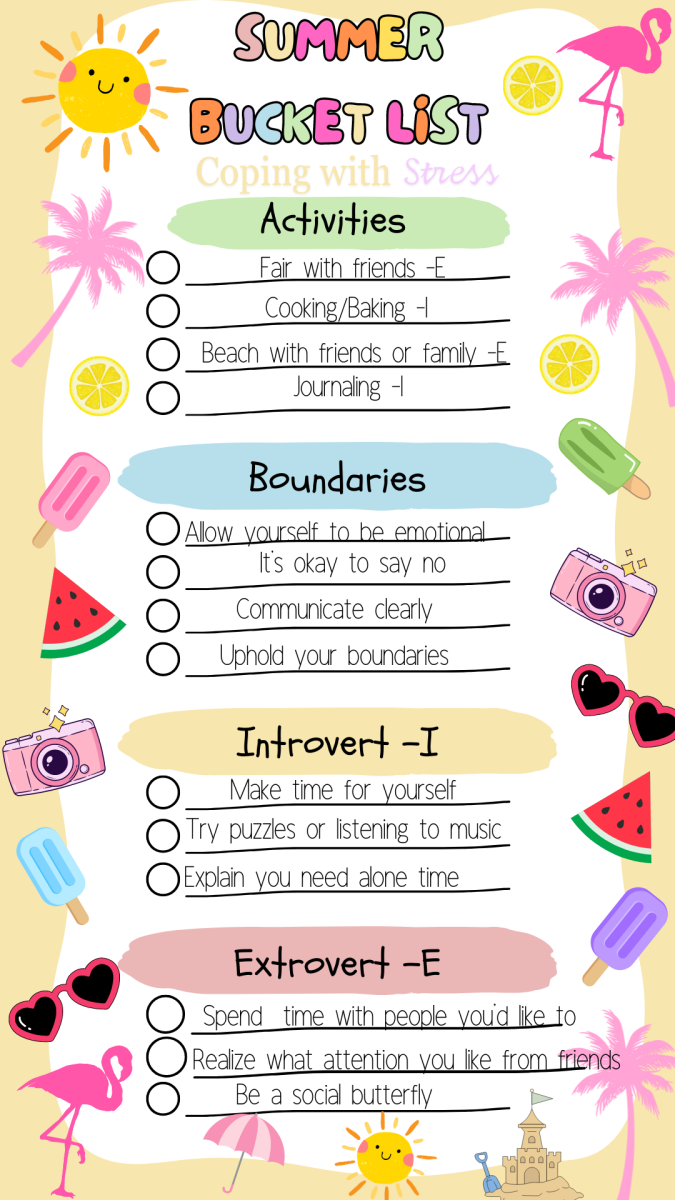Journaling, listening to music, nature walks and setting boundaries. All of these coping mechanisms can help with your main mental stressors as the summer peeks around the corner. Many main mental stressors can come from different categories such as family differences, financial stress, academic stress and lost loved ones. These emotions can be difficult to manage because society expects us to be happy, but with the correct assistance, they can be managed.
It’s no secret academics can add to our stress levels, especially when most of us are already feeling downhearted by our personal problems. Fortunately, there are a lot of strategies to help manage, maintain or even initiate happiness at any time. The key strategies are to engage in activities that align with your personality types, pursue hobbies you enjoy and set boundaries while permitting yourself to enjoy the summer season.
The American Psychological Association conducted a study featured in Deborah Netburn’s article. Three key ideas from this report are that 38% of kids said school was responsible for at least some of the stress in their lives. The usual stress level reported by teens during the school year was 5.8 on a 1-10 point scale, and during the summer, teens’ stress levels went down to 4.1 stating academics plays a huge part in teenagers’ main mental stressors.
Senior Joseph Lira gives his opinion on academic stress.
“My stress is going to get worse because of college,” Lira said.
Academic stress has always been a main mental stressor in adolescents’ lives,but it is important to know how to cope with it.
Psychotherapist Deisy Soria said, “It is important to express feeling in an effective way, always keeping in mind that nobody is in charge of your feelings.”
Setting boundaries, whether with yourself or others, is a personal goal that can help cope with stress. Remembering that maintaining these boundaries requires considerable effort from yourself can further reinforce their importance.
“If you decide to not be around others it’s okay; it just means you are choosing what makes you happy,” Soria said.
Soria expresses issues that could provoke an uneasy feeling within an individual.
“There are multiple triggering factors that worsen symptoms of anxiety and depression so just to mention a few I would like to mention grief, loss of job, loss of not being able to be social, and medical conditions,” Soria said.
Counselor Janet Montes specifies different reasons why people tend to experience melancholy.
“When it’s more cloudy, the colors are not as bright, in general people’s moods tend to change because people are very affected by the weather…I can also see how anxiety and depression are accelerated on top of that as well as different family dynamics and it can get overwhelming,” Montes said.
Teenagers tend to not talk about their emotions because it is easy to get judged, but they don’t know that not expressing your feelings can have many downsides.
“Bottling up your feelings can have effects both emotionally and physically by feeling more overwhelmed when you don’t talk about it, meaning you usually get more irritable, have less patience, headaches, harder to focus and breathe calmly, because you’re dealing with so much by pushing everything away,” Montes said.
Family plays a huge role in our lives, yet many teenagers hesitate to confide in their families about their feelings due to a lack of belief in acknowledging mental health challenges.
“Family can be a really big factor in creating stress or overwhelming you in more stress. Whether you have a big family or don’t have a family, that takes a lot of stress and can be a reminder of things you wish you had, exasperate your feelings of loneliness, or being forced to be under the same roof of family members you don’t get along with,” Montes said.
There are many ways to cope with difficult emotions that are recommended by people who specialize in these fields.
“People can use meditation, exercise, the use of hobbies that bring joy and people can try to use effective and assertive communication with others to communicate needs and feelings. Practicing feeling comfortable setting boundaries [saying ‘no’],” Soria said.
It takes a lot of courage to continuously set boundaries. Montes expresses how to help with this issue.
“Making time for yourself and also just being aware of how it feels in your body when you’re stressed so you know what happens to your body when you’re overwhelmed and how to use your coping skills,” Montes said.
Soria shares the activities that have helped her patients relieve stress or the feeling of sadness.
“Some people have shared with me that they like reading, planting, cooking, running, drawing, painting and listening to music,” Soria said.
Setting boundaries is one of the most difficult things to accept because as a human being we can feel sympathy when we say no to someone.
“Allow yourself to feel sad, angry, stressed but also allow yourself to feel happy,” Soria said.
Montes formulates the different personality traits and what might help the individual personalities better.
“If you’re more introverted it’s spending more time making time for yourself,” Montes said.
Lira explains he considers himself an introvert and mentions what he does to relieve stress.
“I mainly deal with stress by listening to music, playing video games with friends and having time for myself,” Lira said.
Montes describes the personality traits of an extroverted person and what might help them to alleviate stress.
“If you’re more extroverted, it’s actually making a priority to spend time with the people that you actually like to spend time with,” Montes said.
Many people can like different sorts of attention when being an extrovert because some people like the attention of family and others might prefer to be around friends.
“When I’m in a familiar area I can be more extroverted but I like going to the beach and for the summer I’ll be going to Europe with my family,” senior Josiah Valdivia said.
Most people think of boundaries as a positive, but they don’t realize it can be difficult to maintain their boundaries but there are many resources that can help you with this like counselors and therapists.
“I think most people think about the good thing about boundaries, but no one talks about how it can be hard to create a boundary and stick with it,” Montes said.
We will be happy with time and don’t let the bad memories outweigh the good.
“Boundary setting starts with setting boundaries with yourself,” Soria said.


































